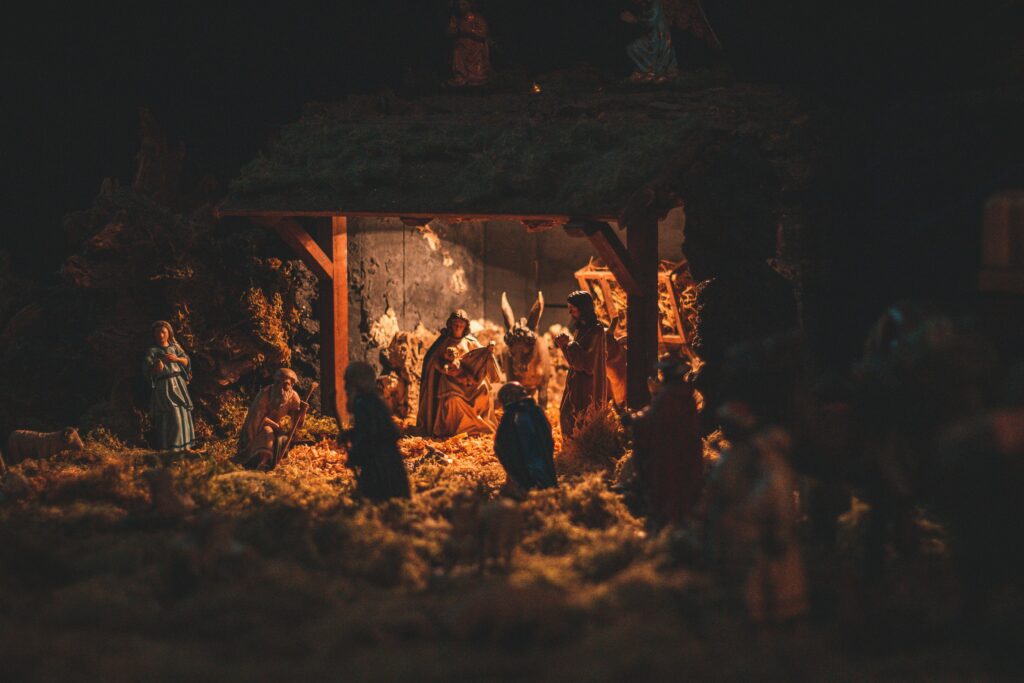
REGARDING THE SHEPHERDS
At night the shepherds took their sheep to the sheepfold, a walled structure topped with briars to protect the sheep from thieves and wild animals. The gate was the sheepfold’s only proper entryway, and a guardian kept watch there to keep trespassers from getting in. (Ligonier Ministries, 2024)
Because usually an older child or young teenager in the family stays with the sheep through the night rather than an adult (see 1 Sam. 16:11 and 17:15, where the Hebrew text reads that young David “watches over his father’s sheep”). Even today, children of Middle Eastern shepherds mind the sheep through the night, whereas the adults spend nights out of doors only during the birthing period or during a crisis. Luke’s description features adult shepherds who are with the sheep (Brown, S. K., 2013)
In ancient near-east culture, its usually young boys and girls who are delegated in night watch to guard and monitor the flocks. This responsibility is taught early in childhood. (Laan, R. V., 2015) geographically, historically, and prophetically. The ancient prophet Micah foretold that the Messiah would be born in Bethlehem (Micah 5:2). This prophecy was confirmed in Matthew’s gospel, answering for us the relevance of Bethlehem.
One regulation in the Mishnah “expressly forbids the keeping of flocks throughout the land of Israel, except in the wildernesses – and the only flocks otherwise kept, would be those for the Temple-services” (Bab K. 7:7; 80a).
Jerusalem and Bethlehem, and their surrounding fields were not in the wilderness where ordinary flocks of sheep were kept. Therefore, according to the Jewish regulations, the flocks under the care of the shepherds near Bethlehem must have been “for the Temple-services.” These shepherds watched over sheep destined as sacrifices in the Temple at Jerusalem.
Shepherds of significance
Everything points to these shepherds watching over sheep used for sacrifice. What would they have thought when they heard: “Today in the town of David a Savior has been born to you; he is Christ the Lord” (2:11).
The message of the angels signified, among other things, that the time of animal sacrifices would soon end. The offering of Jesus Christ, the Savior, would soon take place. (MacDonald, J. B., 2023)
REGARDING TO THE MESSIAH
The Baby
The Bible is full of babies, godly babies, who influenced the course of sacred history just as profoundly as any adult. Religious people may scoff at this notion, which is why the first of these wondrous infants was named Isaac, a word meaning laugh. Isaac was the original grace-child, the child of divine promise who simply by being born confounded all mature, responsible notions of religion and glorified the God of grace. And then there was Moses. Who can doubt that the Lord was just as mightily at work, for the salvation of His people, in the baby Moses as He was in the adult Moses? Hebrews 11:23 tells us that “by faith Moses’ parents hid him for three months after he was born, because they saw he was no ordinary child.” How did they know? What did they see in this tiny, mewling newborn? They must have seen something of what the shepherds saw when they entered the stable in Bethlehem, or of what Simeon and Anna saw in the temple when they broke into ecstatic prophecy before a tiny stranger, eight days old. Or consider the story of John the Baptist, whom Scripture records as being “filled with the Holy Spirit even from birth” (Luke 1:15). More remarkable still, when the Messiah was little more than a single cell inside the womb of a young virgin, at His first approach the baby John leapt in his mother’s womb (Luke 1:41)—proving once and for all that even an unborn fetus can be a born-again Christian! God is sovereign! As Psalm 22:9 declares, “You made me trust in you even at my mother’s breast.” (Mayson, M. 2018)
Hannah is one of a number of biblical women (Sarah, Elizabeth, Rachel, Rebekah, etc.) whose inability to bear children is ‘healed’ by divine intervention. In Hannah’s case, she has promised the Lord in prayer that if she is allowed to bear a son, she will “give him to the Lord all the days of his life” (1 Sam. 1:11 RSV). When her prayer is fulfilled, she does, indeed, bring her son Samuel to Eli, the priest in Shiloh, and leaves him to serve the priest with this expression of gratitude.
The metaphysical lesson is important and, sometimes, difficult. It tells us that the good we receive from our Oneness with the divine does not belong to us; it belongs always to God. Hannah gives birth to the son she wanted, but she does not get to keep him at home. Her joy comes in knowing that her son is serving God, and in watching him “grow both in stature and in favor with the Lord and with men” (1 Sam. 2:26 RSV). We, too, will find our greatest joy in appreciating the positive energy our prayer commitments create in the world. (Unity.org)
Luke 2:11 NLT
The Savior—yes, the Messiah, the Lord—has been born today in Bethlehem, the city of David!
Three great titles that reveals the greatness of Mary’s baby
The Savior
Luke 1:69 ESV “…and [The Lord God of Israel] has raised up a horn of salvation for us in the house of his servant David,” Acts of the Apostles 5:31 NLT”Then God put him in the place of honor at his right hand as Prince and Savior. He did this so the people of Israel would repent of their sins and be forgiven.”
Many Jews envisioned the Messiah as a military conqueror who would lead them into battle against their enemies. They expected him to be a warrior king like David, who would defeat their oppressors through might and strength.
The Christ
Acts of the Apostles 5:42 NLT
And every day, in the Temple and from house to house, they continued to teach and preach this message: “Jesus is the Messiah.”
Acts of the Apostles 17:3 NLT
“He explained the prophecies and proved that the Messiah must suffer and rise from the dead. He said, ‘This Jesus I’m telling you about is the Messiah.’ “
Christ in Hebrew translation is Messiah
The Jewish expected a Messiah that is had to be a given that the Messiah would be Jewish. The Messiah would have to be a charismatic leader to get the whole nation of Israel to follow Him. This utopia created by the Messiah would be for more than just the Jewish people; it would be for the world. (Elaine, 2019)
The Lord
The Jews were looking for a king who would reign on earth, establishing a physical kingdom. They imagined this savior sitting on a throne in Jerusalem, ruling over a peaceful and prosperous nation. (Alikor, R., 2024)
REGARDING ANGELS
The term “angels” refers to spiritual beings who were created by God before the world was created for the purposes of worshipping him and accomplishing his will.
What Is the Role of Angels?
- Angels are “ministering spirits” (Heb. 1:14) that carry out the bidding of the Creator. To serve the people God saves. One purpose of angels is to minister to the elect of God: “Are not all angels ministering spirits sent to serve those who will inherit salvation?” (Hebrews 1:14). Paul experienced an angelic visitation during a storm at sea. The angel brought him comfort (Acts 27:23–24). Others who have been served by angels include Elijah (1 Kings 19:3–8) and Peter (Acts 12:6–10).
- To deliver messages. The word angel literally means “messenger.” In the Bible, angels usually appeared as men when they delivered messages from God to people (see Genesis 18:1–3). The angel Gabriel appeared to at least three people in the Bible. He interpreted a vision for Daniel (Daniel 8:16), told Zechariah about the birth of John the Baptist (Luke 1:19), and proclaimed to Mary that she would be the mother of the Messiah (Luke 1:26). Angels in the form of men also warned Lot of God’s impending judgment on Sodom and Gomorrah (Genesis 19:1).
- To worship God. Angels constantly surround the throne of God, worshiping and shouting His praises (Psalm 148:1–2; Isaiah 6:3, Hebrews 1:6; Revelation 5:8–13). Since angels were created to worship God, their rejection of that purpose is an unforgivable wrong. When Lucifer, a chief angel, refused to worship God and insisted that angels worship him instead, God cast him from heaven (Isaiah 14:12–18). Angels siding with Lucifer were exiled with him.
- To serve. Angels exist to do the will of their Creator. They go where God sends them, say what He gives them to say, and minister to His children on earth (Psalm 103:20; Revelation 22:9; Hebrews 1:14). After Jesus’ forty-day temptation in the wilderness, angels came and ministered to Him (Matthew 4:11). When the righteous die, it seems that angels carry them straight to the place of God’s rest (Luke 16:22).
- To aid in the transmission of God’s Word. Hebrews 2:2 “For since the message declared by angels proved to be reliable, and every transgression or disobedience received a just retribution”. Speaking of the Mosaic Law, calls it “the message spoken through angels.” Somehow, angels were involved in the process of Moses receiving the law on Sinai, revealing yet another purpose of angels.
God uses angels any way He chooses. Because we hardly know anything about a world outside our physical universe, we cannot possibly understand all the purposes angels fulfill. But Christians have the confidence that God’s holy angels stand ready to protect and deliver God’s mortal children (Psalm 91:11). While angels are created beings, as we are, and should never be worshiped, we can thank the Lord for them and the unseen ways He uses them to impact our lives.
(From:Gotquestions?.org)

